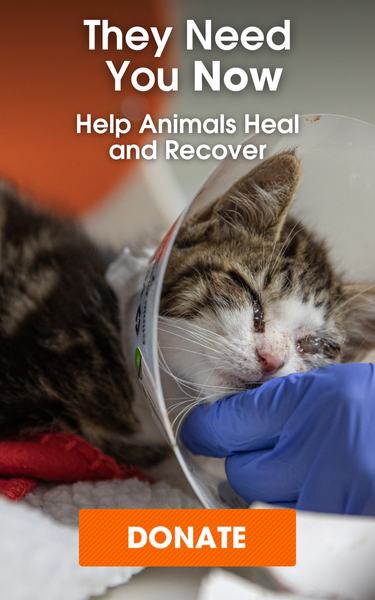
Youngest L.A. Bottle Baby Flourished in Foster Care

On a cold and rainy February day in Southern California, a tiny two-day-old kitten was dropped off at the Downey Animal Care Center in Los Angeles County.
The little kitten became the youngest “bottle baby” of kitten season—otherwise known as the feline breeding season—which typically takes place from March through October in Los Angeles. “Bottle babies” are kittens who are motherless—oftentimes because well-meaning animal lovers separate them from their mom when they find them outside—and need feeding every two to three hours around the clock.
In 2017, to best help these very young animals that arrive at the shelter, the ASPCA launched the ASPCA Los Angeles Foster Program in partnership with the County of Los Angeles Department of Animal Care and Control (L.A. DACC). The program works with all seven L.A. DACC care centers and has assisted nearly 10,000 felines, many of them neonates.

“We found a foster caregiver for her, and off she went,” says Arlene Hall, a Registered Veterinary Technician for the L.A. Foster Program. “She left with a full belly, cuddled in blankets on a warm heated disc, with a stuffed animal by her side.”
From ‘Old Ladies’ to ‘Tiny Babies’
At 75 grams—roughly the weight of an egg—the newborn kitten was transported to the office of Samantha K., an attorney who has fostered more than a dozen kittens for the ASPCA since 2020.“My co-workers thought she was great,” says Samantha. “They started calling her Bitsy, and she became Mitzy. She’s pretty sassy for such a little one and is growing into her name. She’s vocal and very active.”

Samantha has always loved animals. Her first cat, a long-haired calico (a cat of any breed with a tri-color coat) named Katherine, lived to be 18. In college, Samantha adopted an older, long-haired calico who lived to be 20. Six months later, she encountered another older calico who lived about six more months.
“The old ones tugged at my heartstrings,” says Samantha, who heard about the L.A. Foster Program at CatCon, a convention for cat lovers, in 2018. When she started working from home during the pandemic, Samantha decided the time was right to foster.

“I switched from adopting the old ladies to fostering the tiny babies,” says Samantha, who now takes her bottle babies to the office. “My clients get to meet the kittens. It’s fun for all of us.”
A Scary Setback
Late during the night of March 10, Samantha took Mitzy to an emergency clinic.
“She was having diarrhea and stopped eating, which was unusual for her,” Samantha says. “She was lethargic. I panicked a little.”

Too young yet for vaccines, Mitzy was given fluids and tested negative for panleukopenia, a highly contagious viral disease that requires strict isolation and aggressive supportive treatment.
“It was a long ten minutes waiting for those test results,” Samantha says. “They got her started on dewormer, and her appetite picked up slowly the next day.”

As of March 13, Mitzy weighed 265 grams—just over half a pound. Once she reaches two pounds, she can be spayed and put up for adoption.
“It takes a village to get these little ones to adoption,” says Arlene. “They’re first seen by our medical team; then the foster team finds an appropriate foster home and stays in contact with the foster caregiver for support. Kittens re-visit medical teams when necessary, and our Midwest Office team provides after-hours support. Finally, our Placement team finds destination partners for adoption.”
Focused on Fostering
While she’s cared for many kittens over the years, Samantha has not adopted any of her young feline charges.
“I see myself as a long-term foster,” says Samantha.
She and her husband, Ryan, have two cats and two dogs—a Dachshund and a Chihuahua. Ryan supports Samantha’s fostering.

“I let him play golf, and he lets me foster kittens,” she jokes.
Samantha, who keeps the fosters in a spare room away from her other pets, says that caring for kittens is similar to caring for older pets.
“They’re toothless, and require special food and more medical care,” she says. “But they’re also rewarding in different ways.”
“With the older ones, you don’t know what they’ve been through or why they ended up in a shelter. Something obviously didn’t go well, so providing them with a safe place to live out whatever time they have left is rewarding,” she explains. “With kittens, instead of being their final destination, you’re their jumping-off point,” Samantha. “You’re hopefully setting them up to have a good, long life with their adoptive families.”
Even for the most experienced and dedicated foster caregivers, saying goodbye can be tough.
“You know they’re going to leave you, but it’s all part of the process,” says Samantha. “I cry when that happens. Then I do it all over again.”

On May 6, Mitzy was adopted by Rosemary and Bruce G. of Reseda, California. The couple, who have been married for 50 years, always had cats but their two most recent felines died earlier this year. A friend of a friend had recommended Samantha’s legal services to the couple, who first met Mitzy when they visited Samantha’s office. When Rosemary and Bruce visited Samantha three weeks later, Rosemary asked if they could adopt Mitzy, who was bigger by then. Samantha happily fulfilled their request, and Mitzy was spayed soon after.
“A house is not a home without a cat,” says Rosemary, adding that it’s been over 20 years since she and her husband had a kitten. “But everything fell into place. We went to the attorney’s office to take care of some business and ended up with a kitten. It was meant to be.”

